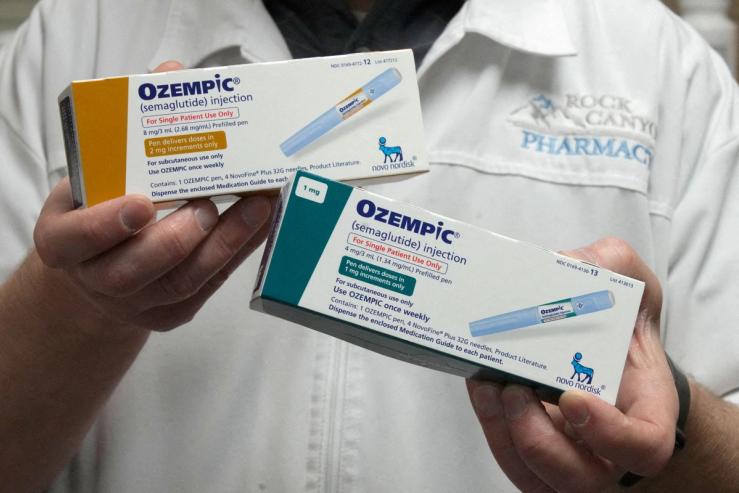The News
Republicans are divided over a decision that’s soon to land on Donald Trump’s desk: Should the government expand coverage of popular weight-loss drugs like Ozempic?
The party’s lawmakers may weigh in on that question soon after the president-elect takes office, thanks to President Joe Biden’s proposal late last month to expand coverage of anti-obesity drugs for Medicaid and Medicare recipients. It’s a proposition that would cost $35 billion over 10 years starting in 2026, according to the Congressional Budget Office — a high number that will bolster the anti-Ozempic crusade led by Trump’s pick to lead the Department of Health and Human Services, Robert F. Kennedy Jr.
Kennedy has instead called for a focus on lifestyle-based strategies like healthy eating and exercise. Meanwhile, Trump’s choice to lead the Centers for Medicare and Medicaid Services, celebrity doctor Mehmet Oz, has openly promoted Ozempic.
Trump will have the power to scrap the Biden administration’s plans for anti-obesity medication after he takes office without formal input from the Hill, but congressional Republicans will likely want their say on the issue. That requires them to reconcile their own internal argument over whether to reject new federal cash for the drugs or agree to short-term spending in the hopes of reducing the long-term cost of obesity-related illnesses.
“Obesity is not a disease. It’s a side effect of different things, like unhealthy eating or whatever,” Rep. Diana Harshbarger, R-Tenn., a licensed pharmacist, told Semafor. “So no, I’m not in favor of that, because it’s going to put us in dire straits and run us out of money.”
That stance puts her at odds with some fellow members of the GOP Doctors Caucus, a group of 19 medical professionals in Congress. Some in the caucus are backing legislation that would allow Medicare and Medicaid to pay for weight-loss drugs, as Biden has pitched.
Rep. Brad Wenstrup, R-Ohio, said his bill on the topic creates a more holistic approach than simple government coverage by requiring that weight-loss drugs be FDA-approved, with doctor-monitored usage alongside behavioral therapies and nutritionists.
“If you want to fight obesity and you have a tool that seems to be working, do it — but closely monitored,” Wenstrup, a Doctors Caucus co-chair, told Semafor.
In this article:
Know More
More than 8 million prescriptions were filled in 2021 for anti-obesity drugs like Ozempic, Wegovy and Zepbound, more than quadruple the number just two years earlier in 2019, the nonpartisan Pew Research Center has reported.
And they have many fans in President Trump’s MAGA movement. So-called GLP-1 agonists were initially used to treat Type 2 diabetes, but their popularity as broader weight-loss aids has sparked shortages and celebrity fans — including Trump’s friend and adviser Elon Musk. Oz is currently promoting the drugs on his website.
No current members of Congress have spoken publicly about using the drug, but soon after his expulsion a year ago, former Rep. George Santos wrote glowingly on X about his “Ozempic experience” and told Page Six that he’d gone back on the drug amid pre-trial stress. Kennedy, however, has warned against pharmaceutical companies marketing them to US users who are “so stupid and so addicted to drugs.”
“I know he didn’t mean it literally, but I mean, I saw an interview where [Kennedy] said, ‘If you just gave everyone three good meals a day … we can cure obesity and diabetes overnight.’ No, you can’t,” Wenstrup told Semafor.
Some of his fellow Republicans agree on the severity of the national obesity crisis, but not necessarily on expanded government coverage as the answer.
“Obesity is such a chronic disease in America, so I’m certainly not opposed to them, and they’re helping a lot of people,” Rep. Marjorie Taylor Greene, R-Ga., told Semafor. “But I do not support tax dollars being used to pay for that.”
Trump’s team could choose to let the Biden proposal advance and avoid stoking the division in the party. But either way, GOP lawmakers have an appetite for taking the lead on the topic.
“The agencies are supposed to do what we say, not the other way around,” said Rep. Michael Burgess, R-Texas.
Kadia’s view
It’s the path of least resistance, in some ways, for Trump to not get in the way of Biden’s proposal to cover weight loss drugs for Medicaid and Medicare recipients. But Trump is known for occasionally resisting that path. And Republicans in both chambers of Congress are touting their plans to cut back on government spending.
So the popularity and benefits of the drugs may not be enough to save them from the chopping block.
Room for Disagreement
To some GOP lawmakers, not covering the weight-loss drugs would be the more fiscally irresponsible choice for Trump. These Republicans point to the high cost the government incurs to treat obesity-linked conditions, including Type 2 diabetes, that might be mitigated by covering Ozempic and drugs like it.
“The cost of Type 2 diabetes for Medicare and Medicaid is astronomical, and this drug reduces weight massively.” said Rep. Mark Green, R-Tenn.
Notable
- Biden’s team is emphasizing the popularity of GLP-1 agonist weight-loss drugs among seniors, which may be a subtle bid to shore up support from Trump for its move, Axios has reported.
- Ozempic maker Novo Nordisk no longer has a financial relationship with Oz, it told The Washington Post.


